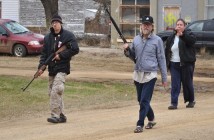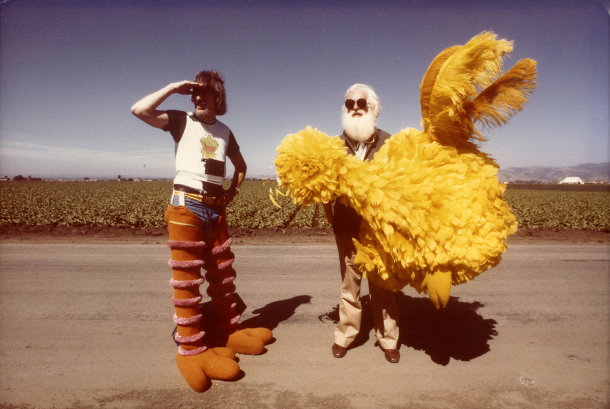Secret Honor (1984)
Cast: Philip Baker Hall
Director: Robert Altman
Country: USA
Genre: Drama
Official Site: Here
Editor’s Notes: The following review is part of our coverage for TIFF’s Company Man: The Best of Robert Altman. For more information on upcoming TIFF film series visit http://tiff.net and follow TIFF on Twitter at @TIFF_NET.
How could this possibly be a Robert Altman film? There’s only one character, for starters and it’s all set in one room. Far from the sweeping character mosaics and open spaces of M*A*S*H*, McCabe and Mrs. Miller, Nashville, A Wedding, and HealtH comes Secret Honor: a film version of a one-man play about a post-resignation Richard Nixon (brilliantly played by Phillip Baker Hall).
The idea is simple: Richard Nixon alone in a large study with a tape recorder sitting down with the intention of dictating a memoir. It becomes so much more as he downs glass after glass of Chivas Regal and he turns it into the deposition/defense that he never got to give. Add to that flashes of his childhood and haunting memories of his Quaker upbringing and you’ve got one hell of a film.
But really, one room and one actor for 94 minutes? That may work on stage but can it work on screen? If your name was Robert Altman, yes it can.
But really, one room and one actor for 94 minutes? That may work on stage but can it work on screen? If your name was Robert Altman, yes it can. Altman could have gone many different directions with this film. He could have attempted to make it look like a stage play and had a few static cameras placed strategically for coverage and cut the film up quickly for timing and pacing or he could have had the Philip Baker Hall as Nixon in a study be an anchor for flashbacks populated by the people in his stories, illustrating them with actors depicting all the folks that were mentioned and create the multi-character mosaic film he was so famous for. Instead, he boldly chose to confine everything in that one room, but made the cameras move and swoop and be the kinetic drivers of an extremely animated and passionate performance.

The film is based off the stage play of the same name with the same actor. Altman saw the performance and spoke with Hall after the show, already formulating how to convert it into a film, according to an interview with Hall. Altman then attended the show regularly, learning the beats and rhythms of the play and working out in his mind how the camera should be placed and what devices could be used to make this one man show set in one room in real time a good film.
To detail the plot of the film is somewhat futile. Hall’s Nixon goes wildly from his background to conspiracy theories about the big money group that he says controlled him throughout his political career starting when he was in the House of Representatives all the way through his Senatorial seat and even as Vice President and President. Then he jumps to his contempt for Eisenhower and Henry Kissinger and then almost hallucinates seeing his mother and what he imagines is her condemnation of him and the way his life turned out. All while drinking glass after glass of Chivas Regal (I think. It could have been Crown Royal, it’s whiskey regardless) and becoming more and more erratic. At the beginning, he pulls out a loaded revolver and sets it on the desk. His first intention seems to be he will record this memoir and then shoot himself, like this tape will exonerate him with the people and his suicide will exonerate him with himself.
The film is based off the stage play of the same name with the same actor. Altman saw the performance and spoke with Hall after the show, already formulating how to convert it into a film …
This all sounds like pretty heady stuff, and make no mistake: it is. But right at the beginning, Hall injects some humor into it while Nixon is fumbling with the tape recorder. He can’t seem to get it to record and starts to lose his temper at it. That little bit goes on for a minute, maybe two, and although it doesn’t diffuse any of the seriousness of what is to come, it sets the expectation that what you are about to see will be unpredictable. You never really know if there is going to be another bit of comedy or if it’s going to continue to be one long tirade or if he’s going to lose his mind by the end. That is the brilliance of Hall’s performance. He shifts from anger to sadness to fear to somewhat lightness to cowering to shame all in succession of each other, no easing from one emotion to another. The performance is a master class in acting. No, that’s wrong. It’s a doctoral class in acting. Hall weaves in and out of stories, keeping pace with himself and Nixon’s scattershot recounting of his life and events. Nixon himself doesn’t know what’s going to come out and when he goes on a long divergence from his intended point, he’ll go back to the microphone and tell his assistant to erase back to a certain point, thank him and then continue, which are little bits of humor interjected after particularly emotionally draining tirades/confessions.
Altman wasn’t sitting back and watching this idle, either. He orchestrated an overhead camera that swooped in and out, a sound guy who was on the floor with a mic because a traditional boom would have interfered with the camera, he introduced a device of a row of security camera monitors on an adjacent table where Nixon could flip switches and see the hallway outside and other parts of his house as well as inside the study, and the camera just sitting there next to the table, pointed at the desk as if to record that he was okay or to have a visual document of what he intended to do at the outset. There are also very few noticeable cuts in the film. Altman used this very mobile camera to prevent having to edit a lot and therefore shot the film in sequence from beginning to end several times and used the performances to craft his film, much like Sidney Lumet did for 12 Angry Men, another filmed play set in one room. The camera is how you know this is an Altman film. It is as restless as his character, always moving seldom sitting still and then not for very long. Altman seems to have learned his lesson from Streamers, another filmed play that didn’t translate to film that well and was his film just before this one.
Secret Honor is often overlooked in Altman’s canon because it seems so atypical. The big ones I mentioned at the beginning (with the exception of A Wedding and HealtH, they aren’t all that good), in addition to The Player, Short Cuts, and Gosford Park are often cited as his best work, but this one deserves to be in that top echelon as well. It is always surprising and riveting and holds up to, and even demands, multiple viewings so you can catch all the things that Altman and Hall are doing and saying. I would even go so far as to say this is one of the best films of the 1980s.
Secret Honor is often overlooked in Altman’s canon because it seems so atypical, but this one deserves to be in the top echelon. It's always surprising, riveting, and olds up to, and even demands, multiple viewings.



